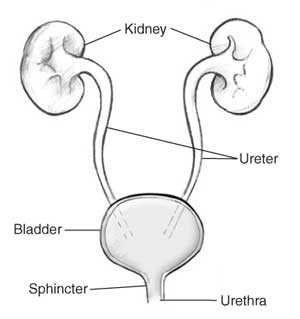Information
The Urinary System
 The urinary system, otherwise known as the urinary tract, consists of 5 major components: 1) two kidneys, 2) two ureters, 3) bladder, 4) sphincter muscle, and 5) urethra.
The urinary system, otherwise known as the urinary tract, consists of 5 major components: 1) two kidneys, 2) two ureters, 3) bladder, 4) sphincter muscle, and 5) urethra.
The kidneys filter waste from the blood and produce urine. The kidneys typically produce 30-90 ml of urine an hour. Urine flows out from the kidneys down the ureters and into the bladder.
The ureters are long, narrow tubes that connect the kidneys to the bladder. Each ureter is approximately 24-30 cm long. The ureters are connected to the bladder in a way that helps prevent urine from flowing back from the bladder into the kidneys. The bladder is a hollow organ with a muscular wall. The two primary functions of the bladder are to (1) store, and (2) empty urine. On average the bladder can hold approximately 500 ml of urine before a strong urge to urinate is felt. The size and shape of the bladder varies from person to person. Emptying the bladder requires coordination of both voluntary and involuntary muscles. Emptying occurs when the bladder muscle contracts and the sphincter muscle relaxes, allowing urine to pass through the urethra and out of the body. Two ring-like muscles called internal and external sphincter muscles surround the urethra. The external sphincter is voluntarily contracted to control when emptying the bladder occurs.
A healthy and functioning nervous system is required to coordinate messages between the bladder and sphincter muscles. When the bladder is full, nerve impulses are sent to the lower portion of the spinal cord, and then to the brain. The brain subsequently sends a message to the bladder telling it to contract and release urine. Damage to the nervous system due to spinal cord injury or disease can disrupt this complex process of communication and result in a neurogenic bladder.
Neurogenic Bladder
A neurogenic bladder is characterized by a malfunctioning bladder, sphincter muscles, and/or messages to and from the brain. Neurogenic bladders can come in the following forms:
-
A flacid or atonic bladder will not contract, which results in the retention of urine. This occurs with a spinal cord injury.
-
A spastic or reflux bladder results in frequent uncontrolled emptying (voiding) from a combination of bladder spasms and lack of sensation. This occurs with a spinal cord injury.
-
An uninhibited bladder results in frequent and urgent urinations. This can occur with stroke, head injury, or multiple sclerosis.
-
A sensorimotor paralytic bladder results in the inability to empty the bladder due to damage to the peripheral nervous system. This can occur with diabetes, mellitus or pelvic surgery.
Urinary Tract Infection
People with neurogenic bladders are more subsceptible to urinary tract infections (UTI) than people with properly functioning urinary systems. Infection occurs when an increased amount of bacteria is present in the bladder, urethra, or kidneys. This can be caused by a bladder that consistently fails to fully empty or from the introduction of a foreign object such as an intermittent or indwelling catheter into the urethra and bladder. Urinary tract infections have different names, depending on what part of the urinary tract is infected:
Bladder: an infection in the bladder is also called cystitis or a bladder infection
Kidneys: an infection of one or both kidneys is called pyelonephritis or a kidney infection
Ureters: the tubes that take urine from each kidney to the bladder are only rarely the site of infection
Urethra: an infection of the tube that empties urine from the bladder to the outside is called urethritis
Causes
Urinary tract infections are caused by germs, usually bacteria that enter the urethra and then the bladder. This can lead to infection, most commonly in the bladder itself, which can spread to the kidneys.
Most of the time, your body can get rid of these bacteria. However, certain conditions increase the risk of having UTI's.
Women tend to get UTI's more often than men because their urethra is shorter and closer to the anus, which contains bacteria. Women are also more likely than men to get an infection after sexual activity. Using a diaphragm for birth control and menopause also increase the risk of a UTI.
The following also increase your chances of developing a UTI:
- Diabetes
- Advanced age (especially people in nursing homes)
- Problems emptying your bladder (urinary retention) because of brain or nerve disorders
- A urinary catheter inserted into your urinary tract
- Bowel incontinence
- Enlarged prostate, narrowed urethra, or anything that blocks the flow of urine
- Kidney stones
- Staying still (immobile) for a long period of time (for example, while you are recovering from a hip fracture)
- Pregnancy
Symptoms
The symptoms of a bladder infection include:
- Cloudy or bloody urine, which may have a foul or strong odor
- Low fever (not everyone will have a fever)
- Pain or burning with urination
- Increased muscle spasm
- Pressure or cramping in the lower abdomen (usually middle) or back
- Strong need to urinate often, even right after the bladder has been emptied
If the infection spreads to your kidneys, symptoms may include:
- Chills and shaking or night sweats
- Fatigue and a general ill feeling
- High fever
- Flank (side), back, or groin pain
- Flushed, warm, or reddened skin
- Mental changes or confusion (in the elderly, these symptoms often are the only signs of a UTI)
- Nausea and vomiting
- Severe abdominal pain (sometimes)
References:
http://www.nlm.nih.gov/medlineplus/ency/article/000521.htm
